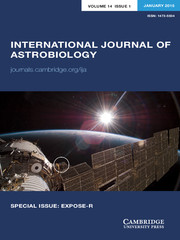Article contents
Extrapolating cosmic ray variations and impacts on life: Morlet wavelet analysis
Published online by Cambridge University Press: 01 July 2009
Abstract
Exposure to cosmic rays may have both a direct and indirect effect on Earth's organisms. The radiation may lead to higher rates of genetic mutations in organisms, or interfere with their ability to repair DNA damage, potentially leading to diseases such as cancer. Increased cloud cover, which may cool the planet by blocking out more of the Sun's rays, is also associated with cosmic rays. They also interact with molecules in the atmosphere to create nitrogen oxide, a gas that eats away at our planet's ozone layer, which protects us from the Sun's harmful ultraviolet rays. On the ground, humans are protected from cosmic particles by the planet's atmosphere.
In this paper we give estimated results of wavelet analysis from solar modulation and cosmic ray data incorporated in time-dependent cosmic ray variation. Since solar activity can be described as a non-linear chaotic dynamic system, methods such as neural networks and wavelet methods should be very suitable analytical tools. Thus we have computed our results using Morlet wavelets. Many have used wavelet techniques for studying solar activity. Here we have analysed and reconstructed cosmic ray variation, and we have better depicted periods or harmonics other than the 11-year solar modulation cycles.
Keywords
- Type
- Research Article
- Information
- International Journal of Astrobiology , Volume 8 , Special Issue 3: Special issue Papers from ESLAB 2008 Symposium Cosmic Cataclysms and Life , July 2009 , pp. 169 - 174
- Copyright
- Copyright © Cambridge University Press 2009
References
- 3
- Cited by


